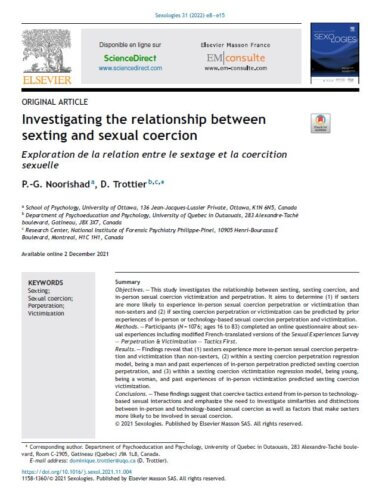Sexting
Investigating the relationship between sexting and sexual coercion.
Open Access: No.
Abstract
Objectives: This study investigates the relationship between sexting, sexting coercion, and in-person sexual coercion victimization and perpetration. It aims to determine (1) if sexters are more likely to experience in-person sexual coercion perpetration or victimization than non-sexters and (2) if sexting coercion perpetration or victimization can be predicted by prior experiences of in-person or technology-based sexual coercion perpetration and victimization. Methods: Participants (N =1076; ages 16 to 83) completed an online questionnaire about sexual experiences including modified French-translated versions of the Sexual Experiences Survey—Perpetration & Victimization—Tactics First. Results: Findings reveal that (1) sexters experience more in-person sexual coercion perpetration and victimization than non-sexters, (2) within a sexting coercion perpetration regression model, being a man and past experiences of in-person perpetration predicted sexting coercion perpetration, and (3) within a sexting coercion victimization regression model, being young, being a woman, and past experiences of in-person victimization predicted sexting coercion victimization. Conclusions: These findings suggest that coercive tactics extend from in-person to technology-based sexual interactions and emphasize the need to investigate similarities and distinctions between in-person and technology-based sexual coercion as well as factors that make sexters more likely to be involved in sexual coercion.
Relevance
In this study, one-quarter of people who sexted were coerced into sexting. Women and gender minorities reported higher rates of sexting coercion victimization.
Sexters, compared to non-sexters, experienced more in-person sexual coercion both as perpetrators and victims.
“Sexters are also more likely to use strategies such as verbal pressure, deception, anger, or guilt, and to take advantage of an intoxicated individual.”
Citation
Noorishad, P.-G., & Trottier, D. (2022). Investigating the relationship between sexting and sexual coercion. Sexologies: European Journal of Sexology and Sexual Health / Revue européenne de sexologie et de santé sexuelle, 31(1), e8–e15. https://doi.org/10.1016/j.sexol.2021.11.004

